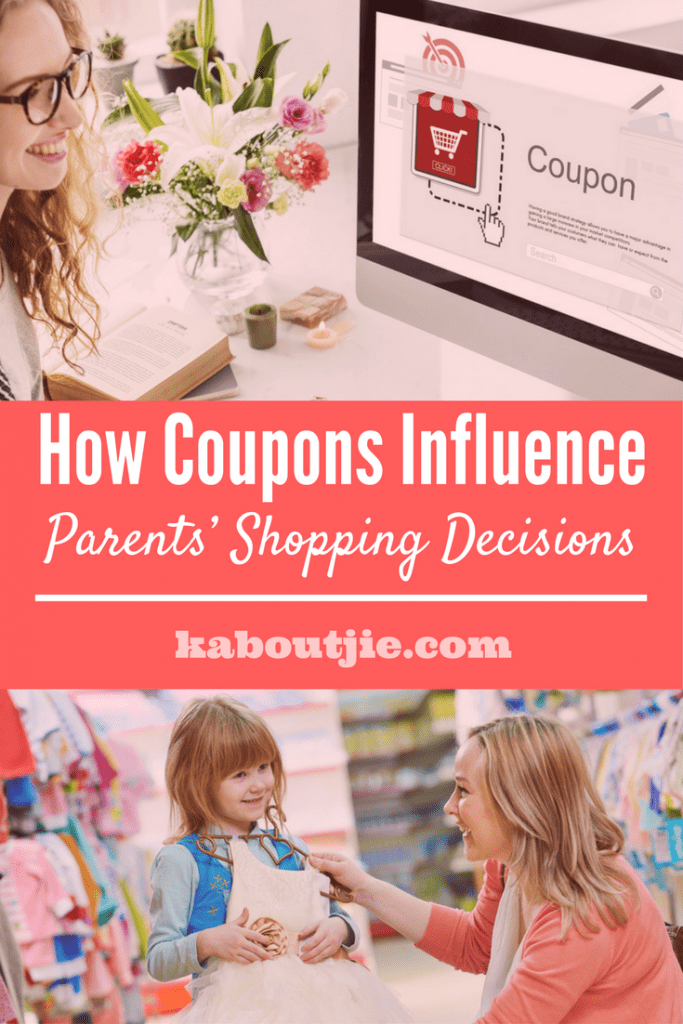Have you ever thought that when you go shopping your decisions are constantly being influenced by savvy marketers and you participate, often unknowingly, in a big marketing scheme called coupon marketing?
As you know, before going shopping, parents prepare a list of items that they need to buy for their homes. I am lazy (or I know I can’t stick to it), so I never write my list down, but other parents are more organised than me; they go shopping with a list meticulously written on a piece of paper. Other, more sophisticated parents, may use apps on mobile devices that help them organize their weekly groceries’ list and have valuable discount coupons available at a touch of a button.
With so many brands offering loyalty perks, it is no wonder why parents tend to include certain products in their shopping list week after week. However, research shows that when parents are actually in the shops, they tend to buy different things. Apparently, parents go home with bags full of items not included in their original shopping list!

Does this sound like you?
If yes, you will be glad to know that this happens to most of us. The reason behind this trend provides a very important insight into coupon marketing psychology that many marketers are masters of. What you need to be aware of as a parent is that usually when you change your mind and you buy product A, instead of product B that you had in your shopping list, you are being part of a marketer’s plan.
Why do stores and online corporations issue coupons?
We said that store deals and discount codes are usually part of a marketing plan. There are many legitimate reasons why marketers decide to give coupons on certain products at certain times. I could write a lengthy article about this topic another time. However, for the sake of this article, let me just give you very briefly the two main reasons for issuing coupons which I happen to know from personal experience.
End of shelf life. This is the length of time a product is saleable. In my family, we have some people who are very successful selling tones of bottles of supplements on Amazon every day. The supplements are stocked on their behalf in an Amazon warehouse, somewhere in the US. Amazon warehouses do not want to keep supplements once they reach their last 6 months of their shelf life. So if you happen to be buying digestive pills from our Amazon page and get offered a deal for a bottle of vitamins tablets for $12.99 (normally selling for $24.99), you know why. You get value for your money because you have at least a year to consume them until they reach their expiry date. The same thing happens in physical stores.
Capture your details. Online and offline sellers have become very smart about how to get your name and email. Let’s assume you receive a bottle of vitamin tables that you ordered from an Amazon store. Once you open the package you see a coupon offering you a 2nd bottle of vitamins for free. To get this offer, the coupon directs you to a page in the merchant’s own website. This is a page different than the Amazon page where you purchased your product. You enter your coupon code in that site, together with your email, name and address, and you proceed to order your free bottle. By doing that, the merchant has taken you off Amazon and you are now in their customer list. The merchant can now remarket you, upsell you and cross sell you.
The same tactic happens in physical stores too. You may get a box of Cadbury’s chocolates from Cash n Carry. When you open it at home you discover a paper coupon offering you a freebie. You have to get that from Cadbury’s website, but once you do that, you will be getting email offers from this merchant. This is just one way merchants and brands leverage on big ecommerce platforms or on big super markets.
Digital products. When marketers sell electronic products, such as software and e-courses, they have to recover only cost of acquisition. Even that, they can recover by having you as a long term customer. There are no production costs, no storage costs, neither any shipping costs. Consequently, marketers of e-products can have huge margins and they can afford to offer massive discounts. This is why in my website Wikigains.com, you will find WordPress Hosting companies like GoDaddy and Hostgator offering you web hosting plans for $1 a month. They can afford that because it does not cost them anything to give you 50MG of storage in a shared hosting server.
Rewards and loyalty plans. We talk about this further down in this article.

How do coupons influence parents’ shopping decisions?
Interestingly, research carried out by intelligent media company Valassis1, proves that eight out of every ten parents tend to base their buying decisions on coupons offered to them rather than their shopping list.
Based on the same research, parents who were brand-loyal shoppers switched brands 69% of the time when they were offered digital coupons via apps or email. Many of them, once they receive these offers electronically, they don’t go to physical stores to buy the items. Instead, they choose to order online so they benefit immediately from digital coupons.
How do coupons influence parents after purchase?
Surprisingly, according to Valassis report, coupons continue to have a great influence on you long after you make a purchase. How is that?
Social media sharing
Furthermore, the provision of shareable coupons by brands and retailers turn you into a key influencer. Thanks to social media sharing, it is possible to drive more sales, as you will communicate your positive buying experience with others. When mums and dads save money on great products they often share photographs or reviews on Facebook or Instagram or on their blogs. For example, bloggers like Leonardo, will share food offers on his nutrition and fitness blog.
According to the same research, 79% of mobile phone users have, at least once, shared a photo or a comment related to a discount they got on a good product.
Loyalty points
As mentioned above, smart marketers have come up with methods to “capture” your details after you make a purchase. This is in an attempt to build long relationships with you and create repeat sales. They achieve this by various methods, such as by using reward programs that allow you, as a customer, to earn extra points on your first purchase. For example, Valassis research showed that 53% of the time, consumers take advantage of loyalty programs by scanning their receipts using their mobile devices. Other times, when orders are completed online, the customers’ email addresses will be used for distributing other offers and coupons.

So why should you care about coupons?
How you respond to these findings depends on who you are.
If you are a marketer, the need to connect with consumers and influence what they buy can never be overstated. Valassis’ coupon research has led to more attention being paid by marketers towards understanding how customers think from preparing a shopping list, to weeks or even months after a purchase is made. We are now also talking about ethical marketing (another topic for another article), a process of creating interest in your products via coupon marketing, while keeping moral, social and environmental values.
I love being marketed at, whether it is in the super market or in an online shop, because I get to learn the tricks that top marketers use. Also, I often spend hours on Amazon to learn free of charge the latest inventions in marketing created by world-class marketers that Amazon pays huge fees.
If you are a parent, it is important to understand that what you put in your shopping cart (in real stores or online) is never an accident. You are constantly and unconsciously being “guided” in your decision making. Often, what you eventually take home is not a result of your decision, but the outcome of an executive decision of marketing board in a huge corporation, like Amazon, that is communicated to you wonderfully camouflaged in the form of a generous coupon.
But what about you? Have you ever been a “victim” of a coupon marketing plan that got you to buy different items that you originally planned? Do you feel that aggressive coupon marketing has violated social values and in what way? Did you ever buy something (digital or physical), that you never really needed, because it was offered to you at a discounted price?
Resources:
- 2017 Coupon Intelligent Report, Influencing Consumers Along the Path of Purchase, Valassis Intelligent Media.
About The Author
Alex Papaconstantinou, graduate of Sheffield Hallam University, England, 1995 with Masters in Management. Serial internet entrepreneur since 2004. Founder of UK voucher site Wikigains.com in 2012. Permanent student of Search Marketing. When not working, enjoying time with family.
 Kaboutjie SA Mommy Blogs by Lynne Huysamen
Kaboutjie SA Mommy Blogs by Lynne Huysamen




